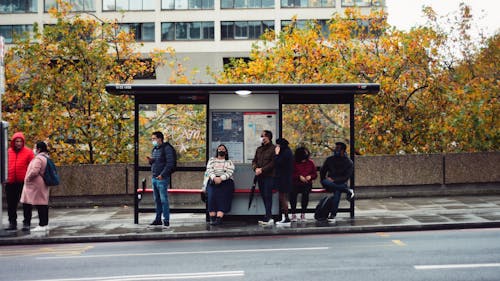MALIK: Lack of investment in US public transportation system reflects classism
Column: On the Good Life

Highways built for commutes have long been a symbol of change and progress, whether that is observed in the construction of more highways or their repair. They are an important symbol, and why wouldn't they be? With increased dependence on cars and cities, it has become more necessary to have proper highways and vice-versa.
As the second largest emitter of greenhouse gasses, it is important for the U.S. to take action in regard to the environmental impact of automobiles. Approximately 27 percent of U.S. gas emissions come from transportation, according to the EPA. But when we think of the alternative, which would logically be public transportation, this seems like a no-brainer.
The country’s public transportation is grossly incompetent, and its history is rooted in our cities and its transitions in response to increasing car usage.
With more cars, cities took over transportation companies, such as buses, "with the notion that they'd maintain these systems as a sort of welfare service — mostly for people who couldn't afford to drive … Nowadays, many local politicians don't see transit as a vital transportation function — instead, they think of it as a government aid program to help poor people who lack cars."
Public transportation has basically been reserved for the poor — a helpful service that most would not want to choose. A quotation that perfectly sums up why transit incompetency is the norm, rather than the exception, is: "It's considered (OK) if the bus comes every half hour if it's a lifeline for people who literally can't afford anything else."
The U.S. has always had a problem empathizing with those who are not well off, and people have traditionally honored great wealth. Andrew Carnegie, John Rockefeller and Bill Gates are our heroes. These are the people we look up to and trust.
I think back to when our gas prices were astronomically high, and still, none of us considered public transportation. I think about the class division caused by the current view of public transit and the reality that many of us cannot imagine the people who do more labor-based work and may utilize buses and trains regularly.
When we choose not to use public transportation, and we are choosing not to see those who use public transit. We are not seeing the people in the working class, so we are not seeing what we have left for them: incompetent systems. And I do not think this was a careless mistake but rather a willful choice.
The Koch brothers have been known for their hatred of public transportation and their push for better highways. As described in this New York Times article, the organization, Americans for Prosperity, "campaigns against big government, but many of its initiatives target public transit. In Indiana, it marshaled opposition to a 2017 Republican gas-tax plan meant to raise roughly a billion dollars to invest in local buses and other projects."
The New York Times also said, "In New Jersey, the group ran an ad against a proposed gas-tax increase in 2016 that showed a father giving away his baby’s milk bottle and also Sparky, the family dog, to pay for transit improvements, among other things. 'Save Sparky,' the ad implores.'"
Notably, along with this juxtaposition, the Kochs are heavily involved with right-wing politics. They and their organization are credited for the "conservative crusade" and the shift to the right in American politics.
Their ability to instill conservative political values through wealth and consequently separate classes through the public transportation system is a notable correlation.
It almost seems to stop any possible social change from taking place as workers of different types and different collars are purposefully separated. No longer is there a vessel of unity, but rather one of purely individual routes, seen in the disparity between cars and subway stations, motorcycles and public buses. We lack the togetherness to cause change or progress, and in turn, we lead more isolated lives.
With this constant clash with others from different walks of life, we go further into our own bubbles of what the world’s truth is, and ultimately, we lose sight of others’ humanity — those who are poor are easily seen as those who do not work hard enough rather than as a victim of circumstance. And this leads to the argument that cases of injustice are the exception in society and not the rule.
Public transportation’s incompetence has been purposefully used to stall human rights progress, ultimately creating a more unjust and isolated world. Injustice and people have been silenced, and the use of cars reveals this cost to society.
Sehar Malik is a first-year in the School of Arts and Sciences where she is majoring in molecular biology and biochemistry and minoring in French. Her column, "On the Good Life," runs alternate Thursdays.
*Columns, cartoons and letters do not necessarily reflect the views of the Targum Publishing Company or its staff.
YOUR VOICE | The Daily Targum welcomes submissions from all readers. Due to space limitations in our print newspaper, letters to the editor must not exceed 900 words. Guest columns and commentaries must be between 700 and 900 words. All authors must include their name, phone number, class year and college affiliation or department to be considered for publication. Please submit via email to oped@dailytargum.com by 4 p.m. to be considered for the following day’s publication. Columns, cartoons and letters do not necessarily reflect the views of the Targum Publishing Company or its staff



